In today’s rapidly evolving job market, the demands and expectations of tech professionals are shifting. Generic perks are outdated; today’s workforce demands a revolution in compensation and benefits. Competitive salaries are now just the baseline, not a differentiator. So what truly drives their enthusiasm?
Our recent Compensation & Benefits survey, with nearly 6000 participants, reveals eye-opening insights into what employees truly value.
A personalized compensation and benefits package, upskilling opportunities, clear career advancement, and ample learning prospects are becoming the new standard for employees. Flexibility and well-being continue to be paramount, with hybrid work options and mental health support setting top employers apart.
From personalized benefits to the importance of equity-based compensation, here are five surprising findings from our Compensation & Benefits Survey.
Concerns over wage inequality
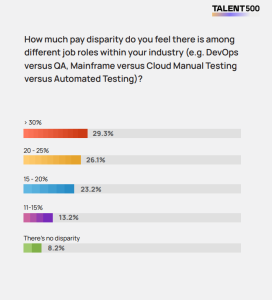
A striking 60% of tech professionals express dissatisfaction with their compensation, highlighting a significant issue in the industry. This concern is compounded by broader challenges like gender disparity and role-based pay differentials.
Perceived inequity: 58.6% of respondents feel that they’re not being fairly compensated for their work
Vastly differing pay scales: Over 56% believe there is a pay disparity of at least 25% among different roles.
These disparities contribute to dissatisfaction and turnover, indicating a need for comprehensive action within organizations to address systemic inequities.
Prominence of gender-based pay gap
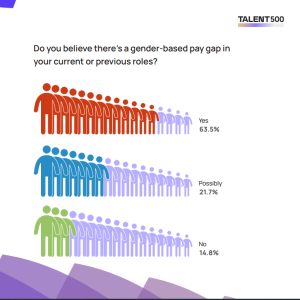
The gender pay gap remains a significant issue in the tech industry.
Persistent disparity: Our survey found that 63% of respondents recognize the gender pay gap.
Contributing factors: Factors such as perceived risk aversion among women, differences in negotiation skills, and enduring gender bias contribute to this gap.
Addressing gender-based disparities in compensation is crucial for organizations aiming to foster a fair and inclusive workplace.
Need for personalized benefits packages
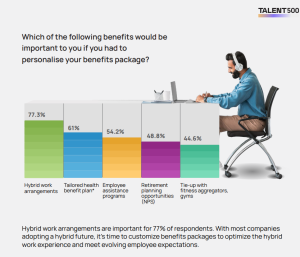
Today’s workforce is looking for benefits that go beyond conventional offerings. Hyper-personalization is now imperative.
Customized health benefits: 61% of respondents emphasized the importance of customizable health benefits programs.
Hybrid work support: With 77% of employees valuing hybrid work arrangements, companies need to tailor benefits to optimize this experience.
Lack of well-being benefits as a dealbreaker: A whopping 82% of workers view well-being benefits as essential, with almost half considering them crucial.
Employers must create flexible and adaptable benefits packages that cater to individual needs, enhancing engagement and retention.
Importance of company stocks & equity-based benefits
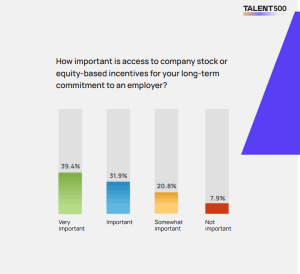
From the survey responses, It is clear that Restricted Stock Units (RSUs) are becoming an essential part of contemporary compensation packages for retaining talent.
RSUs & long-term incentives: 70% of candidates highlight the importance of access to company stock and other Long Term Incentives (LTIs) for their long-term commitment.
Shared success: Incentives like Restricted Stock Units (RSUs) cultivate a sense of ownership and contribute significantly to higher retention rates.
Offering equity-based incentives aligns employee and company interests, fostering a sense of shared success and commitment.
Demand for learning & development programs
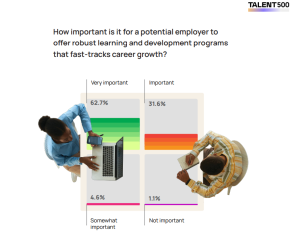
Beyond monetary rewards, tech professionals prioritize career development and leadership opportunities.
Career growth and L&D: Over 90% of respondents consider learning and development programs and career growth opportunities crucial when evaluating potential employers.
Mentorship and stretch roles: 81% express a strong preference for mentorship programs and stretch roles, indicating their ambition for growth.
Companies that invest in structured Learning and Development (L&D) programs and clear career paths can retain top talent and foster innovation.
GCCs: The preferred destination for enterprising talent
An increasing number of international companies are setting up GCCs in India to harness the expertise of highly skilled talent. Known for offering superior compensation and benefits, GCC employees reported higher satisfaction levels than their counterparts in other companies.
Some of the key areas where GCCs are striving to improve employee welfare and satisfaction include:
Better compensation & benefits: More than 60% of GCC employees express satisfaction with their compensation and benefits, with 78% specifically valuing the tax-saving advantages.
Stock options & equity-based incentives: 67% of employees in the GCC region are interested in receiving RSUs or company stocks as part of their long-term commitment to their companies.
Focus on L&D initiatives: GCCs primarily shine in their learning and development efforts, with approximately 62% of employees confirming that these initiatives align with their career goals.
Conclusion
Our survey highlights the ongoing transformation of the talent landscape. Uniform approaches are becoming obsolete. To attract and retain talent, it’s essential to offer modern benefits, fair compensation, and comprehensive Learning and Development programs. Addressing pay gaps, aligning L&D with career goals, and providing customizable benefits packages are crucial steps. To stay competitive, organizations must evolve to meet the varied needs of today’s workforce.
By adopting these insights, companies can cultivate environments where top talent thrives, propelling success in the competitive job market.
[Download the full report]



